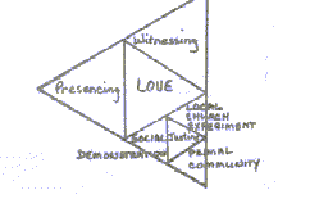
Chicago Centrum T-270 RC
Summer 74 July 8, 1974
Being assigned to give one of these discourses on love reminds me of the boy who was quite impressed by an Ash Wednesday service. What struck him particularly was the ritual repeated over and over again: "From dust you came and to dust you shall return." The next day he came downstairs palefaced and said to his mother, "Didn't they say at that Ash Wednesday service that from dust you came and to dust you shall return?' She said, "Yes, yes, what is it?" He said, "Well, I looked under my bed this morning and there's somebody there, and I don't know whether he's coming or going!"
We have had this whole subject of love under the bed for several years and now we do not know whether we are coming or going. Our approach to love has been through a triangle with the aspects of justing love, witnessing love and presencing love.
This discourse is in the arena of justing love, in the particular arena of primal community. I want to bring primal community into focus in the context of loving the world.
Our times are characterized by a dramatic shift in the quality of primal community. We have in fact a brand new reality on our hands when we talk about community, which means that our experience of human sociality is different than it has ever been before. In fact, we experience human sociality as a protracted struggle, a long march in which everyone of us is engaged. Loving the world is loving that struggle. One breakloose we have experienced then is that loving the world means involving yourself with a body of people in the whole process of battleplanning. We are in the struggle to create human sociality in the midst of a brand new community. This wrestling has allowed us a glimpse of what local globality is all about.
My image of primal community has been informed mostly by such sources as Our Town, Gunsmoke, or sometimes a movie like The Sky Above and the Mud Below, which was about Aboriginal community in New Guinea. The words "primal community" point, for me, to a reality characterized by being local, simple and natural. In point of fact, however, primal community is none of these things any more. Primal community, for me, is now global, complex and intentional or selfconscious.

A little over a year ago, I had a fantastic experience of primal community. I was assigned to a small town in Massachusetts to recruit an RSI. A1l of my images of New England were before me as I drove through western Massachusetts: the autumn leaves turning and a church with a white steeple, the kind of picture that shows up on your Thanksgiving bulletin in Church. That was the town I wound up in. One woman I visited there said that of course there was not going to be any Halloween this year. They were having a party down at the school. I asked why and it turned out that they had banned Halloween in that town. The reason was that the covenant had been broken on both sides. There had been so many razor blades in the apples and drugs in the candy and pranks that had become major vandalism, that the town had outlawed Halloween. Something inside of me caved in on hearing this. If there is no primal community in that town, there is no primal community anywhere. I have not wanted to deal with the fact that local, responsible relationships are collapsed, period.
It is not that people are naughty, but that primal community is no longer local. It is global. One sociologist puts it this way: primal community is that group of people which participates in your funeral. Those are the people to whom you are primarily related. They are not a local group. They come from all over the globe. The group of people that gathers at a funeral gathers at no other time. They have primal relationships of human life which are not local anymore, but global. In the face of these new relationships, local structures have collapsed. Your significance, your identity is not from the "local" you reside in. It is in the global set of relationships you participate in.
My daily experience of life those days one of ineffectivity (which is a nice word for failure). Every time I turn around things are failing. I went out to O'Hare Airport to pick up a vary important person for us in the Montreal Region. We got on the elevator in the new parking garage and it would not stop at the floor where our car was parked. Press number three and it goes to six Press number one and it goes to the basement. Finally, as we drove in from the airport, we talked about what a great city Chicago is. Then we were stopped by a long line of cars at a railroad crossing. The bars were down and no train was in sight. Finally somebody stood up in the front car, got out, and started pushing up the cross bar. The cars began going through this way and that. We continued talking about what a great city Chicago is. In the midst of our conversation, my colleague pointed out that the reason he carries his luggage is that he never seems to get back when he gives it to the airlines. Every place you turn is failure. Life support systems have failed.
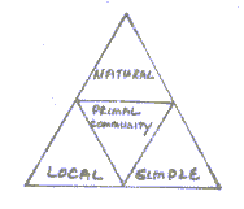
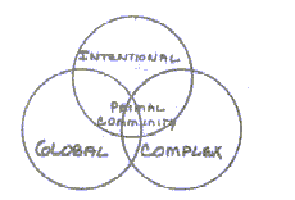
At one time in Montreal the riverboat pilots, the firemen at the airport, the garbage collectors, the white collar workers at City Hall and the mint workers were all on strike. The teachers said they were going to strike, but this was the wrong time. They would not get sympathy because everybody else was on strike. That is how we experience ineffectivity in our time. That is the point where we realize we no longer live in local community, we just live in proximity.
The issue of loving the world therefore becomes, "How do you recreate local community?" To put it better, "How do you create the local forms of global community?" We have primal community but it is global. How do you create its local forms when you know that it is never going to be local in the same way again?
The issue has to do with that dimension of our battleplanning which we call a practical vision. In those Local Community Convocations I saw as I had never seen before that the social process triangles are themselves a practical vision. People who have never had any contact with anything we do walked in and were astounded by the triangles themselves. The man I brought in from the airport yesterday works in public affairs for the Royal Bank of Canada. He is very excited about the triangles. Last week he and one of the people in the Montreal House sat down and analyzed his bank through the triangles. He did not know what to call some things , but they went ahead anyway. They put "banking culture" at the top. The first thing they did was to list all the trends of society, and plot them on the triangles. He said most were in the political, and a lot more in the cultural, but very few in the economic. So he drew that imbalance triangle.
Then he listed about twentyfive of the bank's objectives and plotted them on the triangles and he said that it looked like this:
Then he took the bank's director and listed all the departments in it and plotted them on the triangles and he said that looked like this:
"The conclusion is very very clear," he
said, "the bank's objectives and its operations are totally
out of phase with what is going on in society." So he showed
it to his boss Friday afternoon and he agreed. With these triangles
which he had never seen before, the two could communicate and
reach agreement.
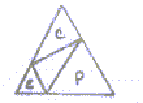
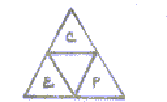

One of the ways we begin to give form to the global community and grasp the ineffectivity of our times is through formulating a practical vision. It is not so much giving people a vision as it is giving the process by which vision comes to any body of people working together. We have seen in the Local Church Experiment that the chart of the thirtysix tactics is already a practical vision of a future form of the local church. It is not the future form of the local church, but it is a practical vision of it. As more than one local church pastor has told me, the Local Church Experiment has shifted the mayor contradiction in the local church. One man said, "Before this experiment I couldn't see anything worth doing. Now I can't do all the things I want to do." The initial 5th City model of twenty structures and eighty agencies was a practical vision. It wasn't the new form of local community but it was already a practical vision. It seems to me that creating pictures like these is what it means to love the world.
That visioning process begins to give sociological form to faith. Whatever else we are doing, we are about the process of recreating in every locality the sociological form of faith which we have called the congregation. What we mean by congregation is that structure which lives before radical possibility and gives form to global community in the presence of all of history and all mankind, in the midst of every local community. That's what the congregation dynamic is: the sociological form of faith.
One galaxy auxiliary has been beating itself over the head for three years now because it does not have a congregation. What the auxiliary members meant was, they had only a handful of people who would show up on Sunday morning. This church is in the midst of a community that is sixty percent French and most of the rest are something else and could not care about going to church anyway. When we talked some more it turned out that once a month, on Wednesday night, a hundred and fifty people come to supper at the church to sing songs and talk about the community. I pointed out to them that most local congregations I know consider a member who comes once a week for an hour on Sunday morning an active member. That broke them loose to see that the congregation, in their situation, is not necessarily all their denomination. We are out to rebuild the sociological form of faith in the local setting.
Community used to be simple; it is now complex. It used to be simple in the sense that everybody was pretty much contained. When I was growing up back inMinnesota, a mixed marriage was a marriage between a Swede and a Norwegian. That was a radical interfacing. I recently had the privilege of being an observer at the gathering of the Provincials of all the religious orders in Canada. A Jesuit priest there gave a presentation on the Catholic world and how it was gone. He laid out the dichotomy of the "world of the Church" and the "world of the world." He said that the old Catholic world had to go as soon as we realized that not only was most of mankind not Catholic, but they were not even Christian. How could we pretend to be a perfect society which was irrelevant to all the rest of the world? He went on to say that the Twentieth Century does not allow any society to operate in isolation. We are all absorbed into the swirl that is the Twentieth Century. That is complexity.
We live in the most complicated sociological reality that has ever been on the face of the earth. We were shocked when we did the Local Community Convocations. We saw how many of them were multi-lingual and how many of those communities are complicated in terms of the cultural diversity. The parish in Montreal is composed primarily of Frenchy Canadians and immigrants who came from Greece, Portugal and Latin America and is salted with some Anglo-Saxon students who go to the university near by. It is the most complicated parish I have ever seen. I read an article about one Italian community in Cleveland which started a community project around bocce-ball games and indigenous things like that. At first I thought, "That's great." But none of us is going to be able to build local community around such cultural homogeneity ever again. It is not a futuric model for local primal community. We are over against human sociality which is just ambiguous.
As the reports came in from the houses on their Guild initiation experiments, they were all the same. They would say, "We have a guild, sort of, but we didn't do the twenty-six week timeline." Everybody said that. When we checked on what they did, it turned out they had lunches with people, they had a LENS course, they had an LCC and so on, but nobody was willing to say that what the did was orthodox. All of our communities are so unique that you never have the luxury any more of just plugging in a model and marching through it. Doing the model means creating on the spot in radical kinds of way.
We have discovered that loving the world has to do with grasping the contradiction and giving complexity and ambiguity a focus. That is never something that can done from the outside; it is always done from the inside. It means that you create a transparency through which people see beneath what they have never seen before.
The Social Methods School is a classic example of what loving the world means in this dimension. We have created there a rather sophisticated instrument to enable people to create a transparency to look through the bottom of what is going on in their situation, and to respond to the depth of it. Loving the world is caring enough to look deep enough to grasp the basic contradiction and respond to it.
I find I trust my intuitions like I have never trusted them before. Most of our methods in this arena are intuitional methods. More and more, as I go about my daily life, I find myself swirling and gapping, swirling and gapping. One cannot operate in a linear pattern anymore. One walks into a situation, swirls and gaps it, and responds to what pops up as the contradiction. We are training ourselves to be the new human beings who have that process so much in our being that we do it all the time. Loving the world means training all kinds of people in that process. Such contradiction analysis is beginning to be the sociological form of hope in our times. Hope has to do with the transparency through which you look to trust in the contradiction that is in the situation, not in something else. The contradiction is in fact your situation - everything else is an appearance. When you trust your contradiction enough to love it, then you begin to have what I mean by the sociologica1 form of hope, or what we have called the cadre. The work of the cadre is to be that kind of hoping in the midst of a local community.
A couple years ago when I was in New Orleans one of our movement colleagues there participated in a set of regional planning councils that HEW (U.S. Department of Health, Education and Welfare) held across the States. He reported that HEW had all these problem solving methods, problematting, brainstorming, and so forth. But, as these councils went on over a period of months he said, "The interesting things was that the clearer we got on the problems the less people we had, until we got very, very clear and had very, very few left." Then he said, "That's where I saw again that when you begin to look into the deeps of life you need something like the cadre. You have to have people who have a way of hoping, not in something else, but in the depths of life itself."
Local community, as I would like to imagine it, ought to be a natural thing. If I go up to somebody and say "Hi", he ought to say ''howdy" back. If I slap him on the back he ought to slap me on the back, not punch me in the teeth If I look white, he ought to look white. Instead, there exists selfconsciousness. I mean selfconsciousness in the sense of "embarrassed and awkward". Human sociality is invented, not natural.
Last fall a couple of us went to Nova Scotia to teach a LENS course to thirty-seven people from all over the world. It looked like the United Nations. There were thirty nations represented, mostly from the "Third World", Latin America, India, Southeast Asia, and Africa. The staff observed that people were participating but also holding back. Then on Sunday morning we realized what was going on. Here was a group of people who were learning how to do credit unions. They were getting trained in all the nuts and bolts of how to do economic development. But the reason they were there and not back in their home country doing that task, was that they knew there was no primal community from which to do such a thing. That fact rather rattled me because I still had the "Sky Above and the Mud Below" images at least in what I would call primitive situations in the villages of the Third World.
A colleague in Edmonton can tell you horror stories about these little towns in the North of Canada. The government has a law by which it pays a person fifty dollars a day to fight forest fires, but if one is asked to fight a forest fire and refuses, he is fined fifty dollars. It's pretty important to fight forest fires in the North. When the townspeople see the fire ranger take off in his plane, they take off on foot. One day the ranger spotted eleven fires. When he went out to find people to fight the fires, one little old lady was the only one in town.
Natural community has collapsed. There is no community save that it is created by raw decision. The weariness that everyone of us has in his bones comes from knowing that nothing happens naturally. We decide what needs to happen as an act of will every time. Creation from nothing is required to have any community at all. I am experiencing these days an inability to do what is there to be done. in the midst of knowing that in just a few minutes I can get a model on the paper, I nevertheless cannot pick up the pencil. Have you had that experience? Getting the assignments out for tomorrow is about a ten minute job, but I cannot pick up the pencil because it is another intentional decision. The burden is the ambiguity of creating structures for civilization.
What is breaking us loose in this dimension of intentionality is the arena of the proposal. The method of creating proposals is that form of indirection that is enabling us to move in the midst of weariness of intentionality. Or, to say it another way, loving the world today in terms of creating primal community is enabling people to create the appropriate proposals. In the Minneapolis Local Community Convocation, a policeman wandered in late in the afternoon, joined one of the groups where I was working and got a feel for what was going on He began to name a few problems when a little old lady at the table interrupted him and said, "We talked about issues this morning. We're working on tactics now." He shut up and a while later said, "I'm thirty minutes late to be back at the station, but I want you to know that you have a friend on the police force."
I think those LCC's taught us all over again that the process of enabling people to make a proposal is the way that history gets created. The dialogue between proposals ensures that there are no bad proposals. Somebody creates a proposal that is not adequate, and another one gets created. Loving the world has to do with creating a proposal and getting it out before a group. If it is not the one that finally wins, so what?
We have a fireman in Montreal who took the LENS course a year ago. Last fall there was a death in the fire department and all the firemen were up in arms. They wanted the captain removed for negligence. They had a whole list of charges and were about to go out on strike. This fireman decided to do something. He called the firemen together and got out all the issues. They worked at it and soon people saw that they were angry because the fireman had been poorly trained to deal with the situation he met in that fire. Any of them would have been dead if they had been in that situation. The contradiction was in their training program, not in the fire captain's negligence. So, they created a proposal to change the training program to equip people to deal with that particular situation. The fire department thought it such a great plan they changed their training program.
Loving the world means that we have people who can do such a job. It does not matter whether they are LENS grads. To have the people who can do that job all across society in every institution and every structure, people who propose the new society in concretions in this institution and that situation, begins to be the sociological form of Love. Our jargon for such people is the guild.
While our former society was in being, it seemed to be perpetual. It was not really perpetual, but because everybody knew what he was supposed to do and pretty much did it, society seemed to go along by itself without having to think or be anxious about it. Our new society is vocational, not perpetual. By that I mean it does not happen unless it is a vocation of people like ourselves and many others. It is not a better vocation than other vocations. It is filled with as much unfulfillment as anything else. I find that, in the midst of being more grateful for this past year, I have less to show for it than any other year I have spent in the Movement. I find that that is a common experience with others. Whatever else is going on in the turn to the world and the vocation to build the new community, it is not, in the first instance, fulfillment, not in the immediate sense at all. Vocation is demanded. And vocation gets grounded in the implementaries. It is no coincidence that at the point of writing procedures we fall asleep. When you write the script for your community, that is where the love for the world becomes most mundane. Love conquers or fails and drive becomes sheer decision when you say who is going to do something, when they are going to do it, why they are going to do it, and how they are going to do it. Such statements literally decide the future and bring in the new community. This is how the new primal community will come into being.
In the midst of giving form to primal community I have fallen in love with the world again, but this love reminds me of adolescence. When I was an adolescent, girls were becoming women, and I was becoming a man. I think the same thing is true here. The world is becoming the world, and we are becoming something other. This otherness gives us the possibility of loving this world. I do not remember deciding to be the Other World but the fact that I am loving this world tells me it is so. I find that fact rather terrifying and yet rather glorious.
. . . Ronald Clutz
8/24/74